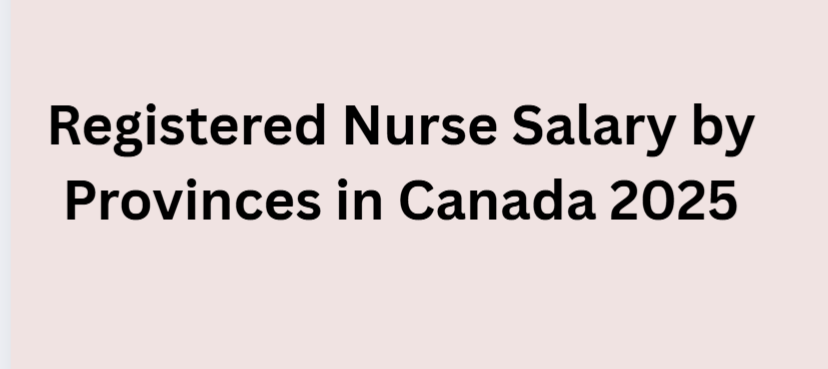Registered Nurse Salary in Canada: For international nurses aspiring to build a career in Canada, understanding the Registered Nurse (RN) salary landscape is crucial. This guide provides an in-depth look at RN salaries across Canada, factors influencing earnings, and tips for maximizing income.
📊 National Overview of Registered Nurse Salary:
According to Talent.com, the average annual salary for a Registered Nurse in Canada is $103,381, equating to approximately $53.02 per hour. Entry-level positions start at around $70,239 per year, while experienced professionals can earn up to $104,706 annually. (ca.talent.com)
The Job Bank reports that hourly wages for RNs typically range from $29.00 to $51.08, with a national median of $42.00 per hour. (jobbank.gc.ca)
Provincial Registered Nurse Salary Breakdown:
Ontario
- Hourly Wage: $28.00 to $50.00
- Median Wage: $42.00
- Source: Job Bank (jobbank.gc.ca)
British Columbia
- Hourly Wage: $32.50 to $52.00
- Median Wage: $45.00
- Source: Job Bank
Alberta
- Hourly Wage: $30.50 to $54.00
- Median Wage: $47.00
- Source: Job Bank
Saskatchewan
- Hourly Wage: $37.06 to $51.07
- Median Wage: $46.82
- Source: Job Bank (jobbank.gc.ca)
Northwest Territories
- Hourly Wage: $45.00 to $66.67
- Median Wage: $56.00
- Source: Job Bank (jobbank.gc.ca)
Yukon
- Hourly Wage: $41.15 to $56.16
- Median Wage: $48.30
- Source: Job Bank (jobbank.gc.ca)
💼 Factors Influencing Registered Nurse Salaries
Several elements can impact a Registered Nurse Salary: in Canada:
- Experience Level: Entry-level nurses earn less compared to experienced RNs.
- Education: Additional certifications or specializations can increase pay.
- Location: Remote or underserved areas may offer higher wages to attract nurses.
- Work Setting: Hospitals, private clinics, and long-term care facilities have different pay scales.
🧭 Career Advancement Opportunities for enhancing Registered Nurse Salary:
To enhance earning potential, consider:
- Specialization: Fields like critical care, oncology, or anesthesia nursing often offer higher salaries.
- Nurse Practitioner: Obtaining a Nurse Practitioner designation leads to advanced roles with higher pay.
- Leadership Roles: Nurse Manager or Director positions typically provide increased compensation.
📝 Tips for International Nurses:
For those trained outside Canada:
- Credential Recognition: Ensure your credentials are recognized by the National Nursing Assessment Service (NNAS).
- Licensure: Obtain licensure through the Canadian Registered Nurse Examination (CRNE) or Canadian Practical Nurse Registration Examination (CPNRE).
- Language Proficiency: Demonstrate proficiency in English or French through tests like IELTS or CELPIP.
🔍 Job Search Resources to see Registered Nurse Salary:
- Job Bank: Government portal listing RN opportunities across Canada.
- Talent.com: Offers salary insights and job postings.
- Provincial Health Authorities: Check regional health authority websites for local job listings.

| Province / Territory | Hourly Wage (CAD) | Median Wage (CAD) | Notes |
|---|---|---|---|
| Ontario | $28.00 – $50.00 | $42.00 | Most populous province; high demand in urban hospitals |
| British Columbia | $32.50 – $52.00 | $45.00 | High cost of living; competitive wages |
| Alberta | $30.50 – $54.00 | $47.00 | Oil-rich province; higher wages in private clinics |
| Saskatchewan | $37.06 – $51.07 | $46.82 | Smaller population; rural incentive pay available |
| Northwest Territories | $45.00 – $66.67 | $56.00 | Remote region; higher wages to attract professionals |
| Yukon | $41.15 – $56.16 | $48.30 | Remote region; competitive salaries |
Does Indian Nursing Experience Count in Canada?
Many internationally educated nurses (IENs) wonder if their nursing experience in India will be recognized in Canada. The answer is yes—but with conditions. Canadian regulatory bodies, such as the College of Nurses of Ontario (CNO), require all IENs to have their education, credentials, and work experience assessed before they can practice as a Registered Nurse (RN) or Registered Practical Nurse (RPN).
Indian nursing experience is valuable and demonstrates your clinical skills and professional exposure. However, it does not automatically qualify you to work independently in Canada. To practice, you must pass the NCLEX-RN (for RNs) or other licensing exams and meet language proficiency requirements. Programs like the Supervised Practice Experience Program (SPEP) help bridge the gap, allowing your prior experience to be applied under supervision while you adapt to Canadian healthcare standards.
In short, your Indian experience strengthens your professional profile, but full recognition requires meeting Canadian regulatory standards and licensing requirements.
📈 Conclusion
Understanding the salary landscape is vital for international nurses planning to work in Canada. By considering location, specialization, and career advancement opportunities, nurses can make informed decisions to maximize their earning potential.
⚠️ Disclaimer
The information provided in this article is for educational purposes only. Salary figures are based on publicly available data as of September 2025 and may vary depending on location, employer, experience, and other factors. Readers should verify salary information and employment conditions with official sources and consult relevant authorities before making career or financial decisions.

